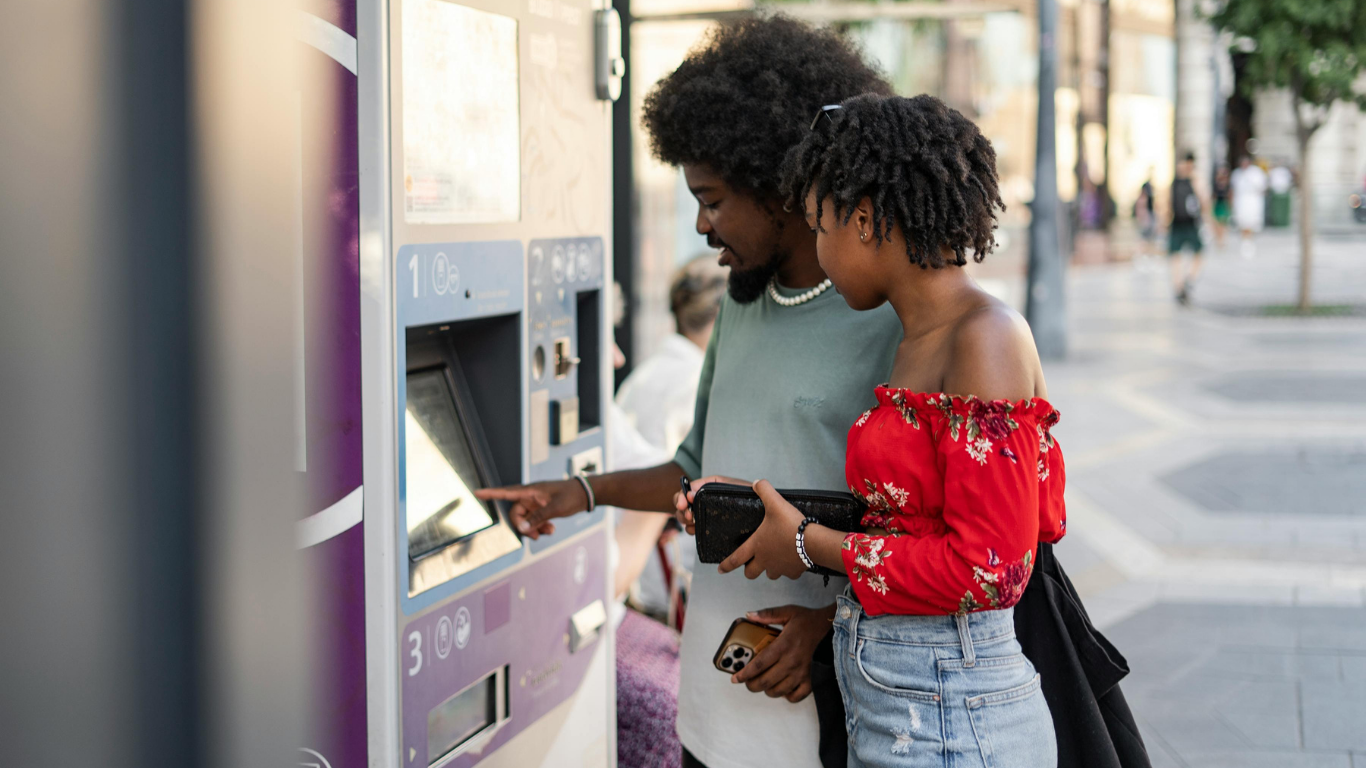
Buying a Bus Ticket
Learn how to ask for and buy a bus ticket from a bus driver. This lesson provides simple, clear phrases to use at a bus stop, helping you feel more confident while using public transport.
BEGINNER
Vocabulary
ticket
A piece of paper or card that gives the holder the right to travel on public transport.
- One ticket to the park, please.
- I need to buy a train ticket.
- Here is your ticket.
dollars
The basic monetary unit of the US, Canada, Australia, and many other countries.
- That will be two dollars.
- The bus fare is five dollars.
- I have ten dollars in my pocket.
Grammar Tip: Using 'would like'
The phrase 'I would like' is a polite way to make a request. It is more formal and less direct than 'I want.' This is a common phrase in many different settings.
Common Mistakes
❌ Using 'I want a ticket.'
✅ The correct form is 'One ticket to the park, please.' or 'I would like a ticket.'
Using 'please' or 'I would like' is a more polite way to make a request in English. It's a key part of polite conversation.
❌ Not saying 'Thank you' after receiving the ticket.
✅ Always say 'Thank you' to show appreciation for the service.
This is a simple social cue. It shows that you are being polite and respectful when you speak to a stranger.
Notes for Learners
- Be ready to make a simple request in a formal setting.
- Practice using phrases like 'Hello' and 'Thank you.'
- Listen for the person's answers and respond with a simple 'Thank you.'
- Remember to give a reason for your request to show that you are being honest and respectful.
INTERMEDIATE
Vocabulary
single ticket
A ticket for a one-way journey.
- I'd like a single ticket, please.
- Is a single ticket cheaper?
- The single ticket is four dollars.
return ticket
A ticket for a journey to a place and back again.
- Could I get a return ticket, please?
- A return ticket is often cheaper than two singles.
- I bought a return ticket to the city center.
Grammar Tip: Using 'Could I get...?'
The phrase 'Could I get...?' is a very polite and indirect way to ask a question. It's a great way to make a request without sounding demanding.
Common Mistakes
❌ Just saying 'I want a ticket.'
✅ Add more detail to your sentence, like 'Could I get a ticket to the central station, please?' This is more polite and shows respect.
Adding more information makes your speech sound more natural and engaging. It's a key part of an intermediate-level conversation.
❌ Not providing a clear and specific plan.
✅ Give a more valid reason like 'Just a single, please.'
This shows you are an engaged student and makes the conversation more personal and practical. A good excuse shows that you are responsible.
Notes for Learners
- Be ready to make a polite request with more detail.
- Practice using a conversational tag like 'Could I get...?'
- Listen for more specific questions and be prepared to give a detailed answer.
- Remember to use more descriptive words like 'single' and 'return.'
ADVANCED
Vocabulary
purchase
To acquire something by paying for it.
- I was hoping to purchase a ticket.
- She purchased a new car yesterday.
- You can purchase tickets online.
efficient
Achieving maximum productivity with minimum wasted effort or expense.
- Your service has been most efficient.
- The new system is more efficient.
- She is an efficient worker.
Grammar Tip: Using the phrase 'I was hoping...'
This phrase is a formal and very polite way to begin a request. It is more sophisticated and less demanding than 'Can you...?' and is perfect for professional or more detailed conversations, especially when you are ordering a specific or unusual item.
Common Mistakes
❌ Using simple language like 'I want to buy a ticket.'
✅ Use more descriptive and formal phrases like 'I was hoping to purchase a ticket.'
Advanced English is about choosing the right tone and vocabulary. Using words like 'purchase' and 'efficient' shows a high level of fluency and a precise understanding of the situation.
❌ Not providing a clear and specific plan.
✅ Provide a clear and specific plan, e.g., 'I have my travel card ready for the transaction.'
This shows you are an informed person and helps the other person understand your goals more quickly and professionally. It's a key part of advanced communication.
Notes for Learners
- Open the conversation with a formal phrase like 'Good morning.'
- Be ready to use and understand specific terms like 'purchase,' 'efficient,' and 'transaction.'
- Acknowledge the employee's help with a phrase like 'Your service has been most efficient' and end the conversation professionally.
- Remember that maintaining a calm and respectful demeanor is key, even when you are frustrated.